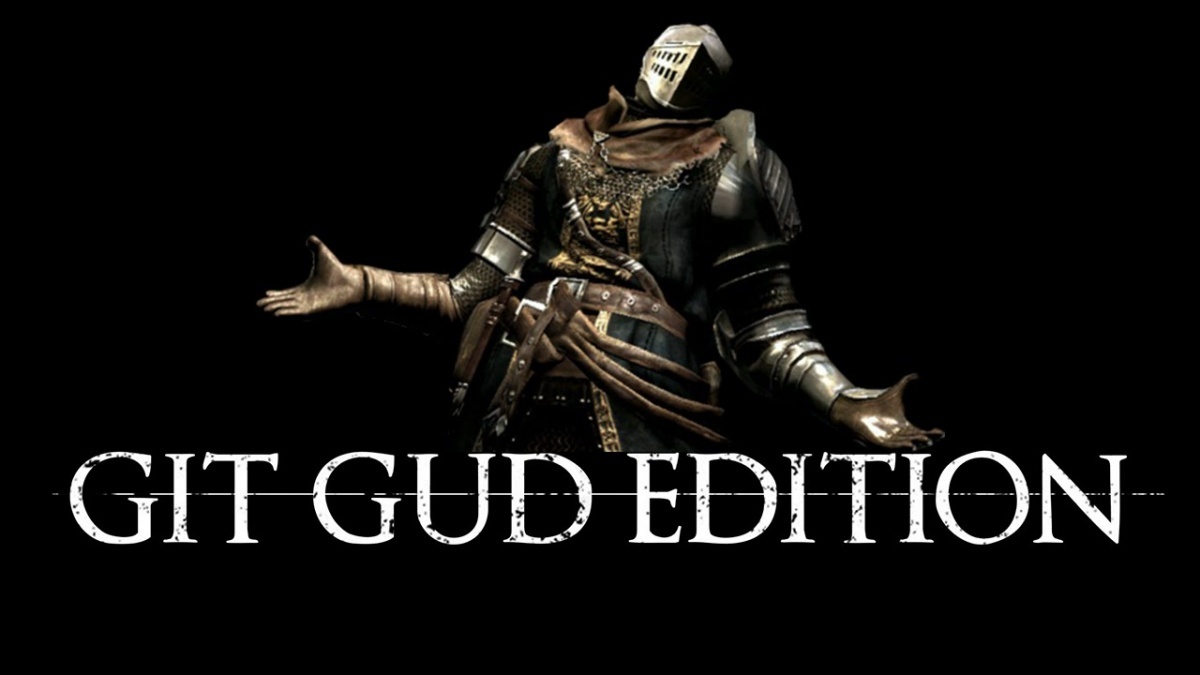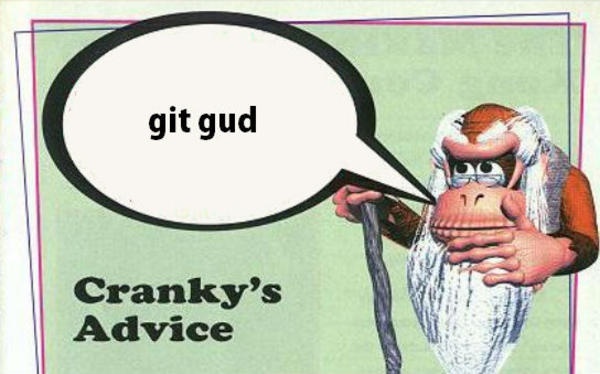
'Git Gud' is a saying anyone will have heard if having ever played a multiplayer game, and possibly even if you have played a single-player title. It seems like such a simple statement. Enter into an online Pokémon match with a Bibarel that wasn't even super-trained and got thrashed. You walked out into the line of fire of a Bastion in Overwatch, or you couldn't stand up to the top-geared player in World of Warcraft in PvP. You go out to do something, anything, in response. Sometimes it's a cry for help, other times it's a cry of outrage, or just frustration at a mechanic that seems unfair. Then this response comes from some smug kid. It answers nothing, is used as an insult as if the reason why you lost was obvious, and irritates you… yet, is it ever right?
Spoiler: the answer is 'no'.
Before moving on, let me make myself clear here. There is a huge difference between 'getting good' and 'git gud.' There are many fine points but, simply put, the difference can be boiled down to this: in 'get good,' the game is already fair and balanced and something only seems imbalanced due to a lack of skill and improvement will result in this issue vanishing. In 'git gud,' the game is not balanced and the way to improve is to exploit the imbalances in it in order to create the illusion of improvement. One is good, the other is not.
That sounds nice but, playing 'college professor' a bit more, what does that actually mean? Can any examples be provided? Well, yes…yes they can.
For every game there is a distinct power-curve. Think of player skill as a spend-able resource and then a power curve may end up looking like this. For one 'unit' of player skill entered, one 'reward' is earned. For two player skill, two reward is earned, yet players need to be a bit more willing to opt for the harder experience, so it's 2.1 reward earned. For three units, it is 3.2 earned, yet players should be willing to invest just a bit more skill and effort to learn the harder method, so they get 3.3 reward instead. This can go on and on and, for the purposes of this example, will serve just fine.

Things, then, follow a power-curve like that. What happens when you get something, though - a weapon/character/skill/play-style - that results in something being above the curve or below it? If a weapon, for example, only takes about two character skill to use, but instead of giving back 2.1 reward it gives back 2.8 - only a select few will even bother putting in the effort to use the more difficult three-cost weapon, while anyone using a one or two weapon that doesn't break the curve will be at a serious disadvantage. Likewise, if a weapon costs three skill but only gives 2.6 reward, why bother investing and expending the extra effort/skill to learn it when a two skill weapon is almost as good? Of course, there will be weapons that don't perfectly fall upon this line, like a weapon that rewards 1.1 for an investment of one, but there is a difference between something being an outlier and outright breaking the curve.
The result of this is that the game can end up being determined not by a player's actual skill level so much as who is willing to exploit the advantage first. Using Bo Jackson in Tecmo Bowl will result in a near-automatic win, so the game becomes less about being skilled at 'Murican football, or even Tecmo Bowl, and more about who can select his team first. If someone picks Oddjob in Goldeneye, the game stops being about trying to outwit and outgun your friends and, rather, about trying to desperately aim low enough to hit him while he runs circles around you. In short, their existence changes the very core mechanics of how the game functions.
Here is where 'git gud' comes in. Say you either have a team of Pokémon that follow the meta perfectly and is idealised. While some would say skill came in with breeding and the like, are you actually a better player? Did the effort of going online to read up actually improve your understanding of the game, or are you merely copying what others have done? If you go in with a team of your favourites that are not idealised for the meta, when you lose to the former, is it because he was more skilled than you or because he went online to make a pre-built team while yours, even if you knew the game inside and out, was not optimised for such a thing?

Here is where the underlying problem comes in. No amount of 'getting good' can overcome such a discrepancy in skill to reward. This isn't to say that you should be able to ignore the meta and do just fine (you never should) but, rather, that the game has come to revolve around a few pre-set ways to play that deviate heavily from how it's balanced. If, in Magic: The Gathering, Red gained an overpowered spell while all other four colours followed the curve, 'git gud' wouldn't mean improving so much as it would mean either including the overpowered spell in a red deck or putting the few counters to said red spell in your deck if you don't use red. If, however, such a spell had enough common/instinctual counters, and failing to block it did not result in the opponent gaining a massive and unfair edge over you, then said spell, while an outlier in terms of power, is not game-breaking.
By now, the issue should be clear, as well as what the problem with 'git gud' is. However, at the heart of the issue is, simply, a massive attitude problem. It's the notion that things are never imbalanced but, rather, anyone who complains lacks skill - the notion that your skill comes from hours of practice, knowledge, and understanding, and not exploiting a game-breaking flaw. That the person is not being inhibited by an artificial cap on their play method that ensures it will be weaker than it should be but, rather, that they merely lack skill. In short, it's about you. The other person is merely a whiner seeking to disrupt an established order and flow, one that would disrupt your own skills and capabilities. Does the Zerg Rush in StarCraft need a nerf? Does it matter if it's one of your primary strategies? You know its strength, its flaw, and how strong it is, so how difficult exploiting the flaw is doesn't matter, only that your strategy shows that you are skilled.

 Sign In
Sign In 22.04.2017
22.04.2017  Insanoflex
Insanoflex 
 Link to this post:
Link to this post:  Subscribe to this topic
Subscribe to this topic Features
Features





 Top
Top

